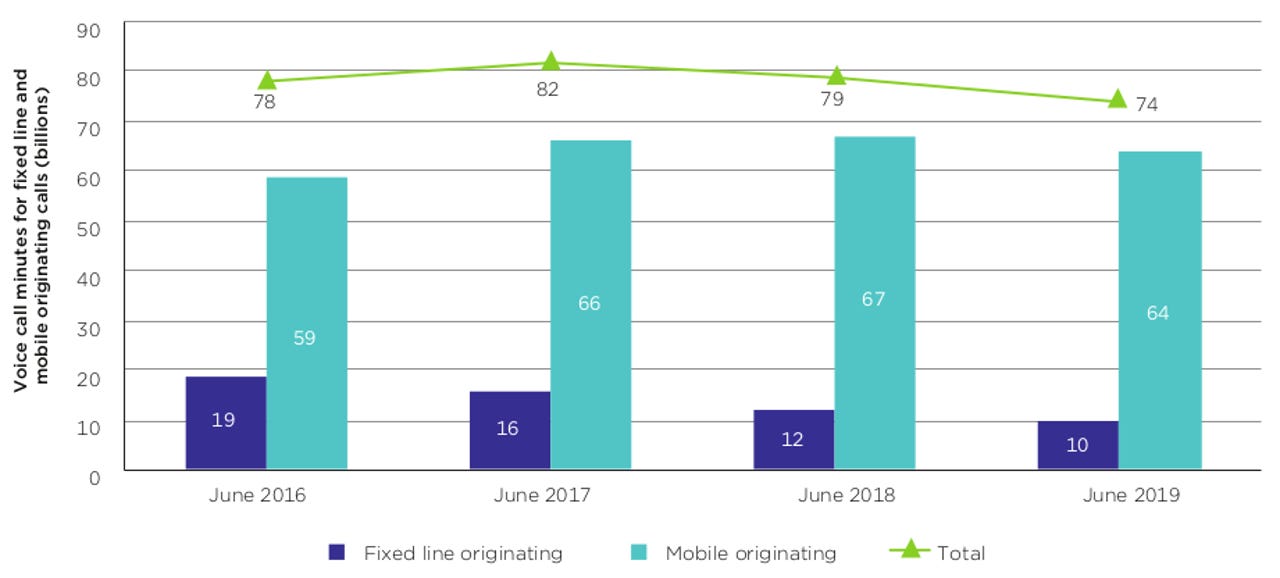Mobile voice minutes start to decline in Australia


The Australian Competition Commission (ACCC) has said in its Communications Market Report for 2018-19 that users of mobiles in Australia are turning away from using voice, as fixed-line users have for some time.
Usage of voice peaked in the financial year to June 2017, with 82 billion voice minutes made across the country, made up of 66 billion from mobiles and 16 billion minutes from fixed-line connections. The next year, mobile minutes increased to 67 billion, while fixed-line continued to fall away to 12 billion minutes. For the year to the end of June 2019, mobile minutes dropped to 64 billion, and fixed-line minutes fell to 10 billion.
"For the first time, mobile voice minutes reported by carriers have also shown a significant decline, by about 3 billion minutes over the year, despite the prevalence of unlimited calls on mobile plans," the ACCC said.
"This indicates an increasing preference for over the top (OTT) communications services (e.g. WhatsApp, iMessage and Facebook Messenger), either voice or messaged based, over traditional voice services."
The fall in voice minutes occurred despite the number of mobile phone voice services in operation (SIO) increasing to a new high of just over 28 million SIOs. The number of fixed voice SIOs, meanwhile, dropped from 8.5 million to 8 million.
The ACCC also noted that overall data consumption jumped 47% in 2018-19 fiscal year, with 88% of it occurring over fixed-line connections. Despite calls of an impending wireless attack on fixed-line connections, the percentage of Australians using mobile alone for broadband access dropped by 7 points to 16%.
The report showed a pivot point existed around the AU$60 mark, where it is cheaper to get more data by using a non-NBN connection below that amount and receive more data on NBN plans compared to alternatives above that dollar amount.
"These non-NBN plans often include unlimited data, while the entry-level plans on the NBN in this price range have limited data allowances and low download speeds," it said.
"However, the average data allowance for NBN services exceeds non-NBN services in all price points above AU$60."
Reiterating previous concerns that led to it beginning an inquiry, the ACCC said it was worried about the affordability of the entry-level wholesale pricing offered by NBN.
"We have concerns that NBN Co's wholesale pricing has resulted in unfair outcomes for those consumers who have no need for, or do not want, higher speed plans," ACCC chair Rod Sims said in October.
"Most consumers have no choice but to migrate to the NBN if they want to keep their home service active, but are at risk of not being able to obtain a comparable NBN service at a similar price to their ADSL service."
At the end of November, NBN announced new wholesale pricing and said it introduced a modified entry-level bundle the month prior.
Earlier in November, the ACCC had reported an increase in 12Mbps connections on the NBN for the first time in a year.
The ACCC said in its report released on Tuesday that in the case of consumers who are not after faster speeds on the NBN, plans are being pulled from the market, restricting choice, and forcing users into paying more.
"The ACCC is concerned that not all consumers are benefitting equally from investment in communications infrastructure, and there is a risk that some consumers may be made worse off," the report stated.
Complaints against Australia's telco also dropped over the year to June 30, the report said, with Telstra seeing an 18% drop, Optus having 28% less complaints, TPG down 19%, and complaints against Vodafone down by 4%.
"In contrast, complaints made against key hardware suppliers increased significantly, including Kogan Australia Pty Ltd, Samsung Australia Pty Ltd and Apple Pty Ltd," the ACCC said.
Related Coverage
ACCC declares victory after Federal Court rules Trivago misled consumers
The Federal Court found Trivago was using an algorithm to favour booking sites that paid the company the highest cost-per-click fees.
Aussie Broadband pins unlimited 100/20Mbps plan as new NBN flagship
Reducing residential upload speeds on the 250Mbps tier from 100Mbps to 25Mbps allows for an AU$80/month saving.
The ACCC is going to need a standard speed measurement for one ADSL2+
Deciding whether the NBN leaves users 'no worse off' depends entirely on what is being measured.
NBN increasing 12Mbps connections for first time in a year: ACCC
Over 1 million premises are once again on the lowest speed tier available on the NBN.
Optus is the new ACCC NBN speed report king
However the ACCC has an interesting take on networking protocol headers not constituting network traffic.